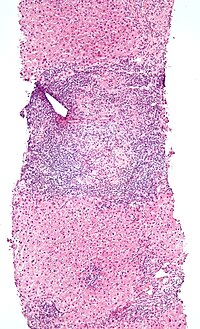
Photo from wikipedia
Intestinal intraepithelial lymphocytes (IELs) expressing CD8αα on αβ T cells (TCRαβ+CD8αα+ IELs) have suppressive capabilities in enterocolitis, but the mechanism that maintains homeostasis and cell number is not fully understood.… Click to show full abstract
Intestinal intraepithelial lymphocytes (IELs) expressing CD8αα on αβ T cells (TCRαβ+CD8αα+ IELs) have suppressive capabilities in enterocolitis, but the mechanism that maintains homeostasis and cell number is not fully understood. Here, we demonstrated that the number of TCRαβ+CD8αα+ IELs was severely reduced in mice lacking recombination signal binding protein for immunoglobulin kappa J region (Rbpj) or Notch1 and Notch2 in T cells. Rbpj-deficient TCRαβ+CD8αα+ IELs expressed low levels of Atp8a2, which encodes a protein with flippase activity that regulates phospholipid asymmetry of plasma membrane such as flipping phosphatidylserine in the inner leaflet of plasma membrane. Rbpj-deficient TCRαβ+CD8αα+ IELs cannot maintain phosphatidylserine in the inner leaflet of the plasma membrane. Furthermore, depletion of intestinal macrophages restored TCRαβ+CD8αα+ IELs in Rbpj-deficient mice, suggesting that exposure of phosphatidylserine on the plasma membrane in Rbpj-deficient TCRαβ+CD8αα+ IELs acts as an “eat-me” signal. Together, these results revealed that Notch–Atp8a2 is a fundamental regulator for IELs and highlighted that membrane phospholipid asymmetry controlled by Notch-mediated flippase expression is a critical determinant in setting or balancing the number of TCRαβ+CD8αα+ IELs.